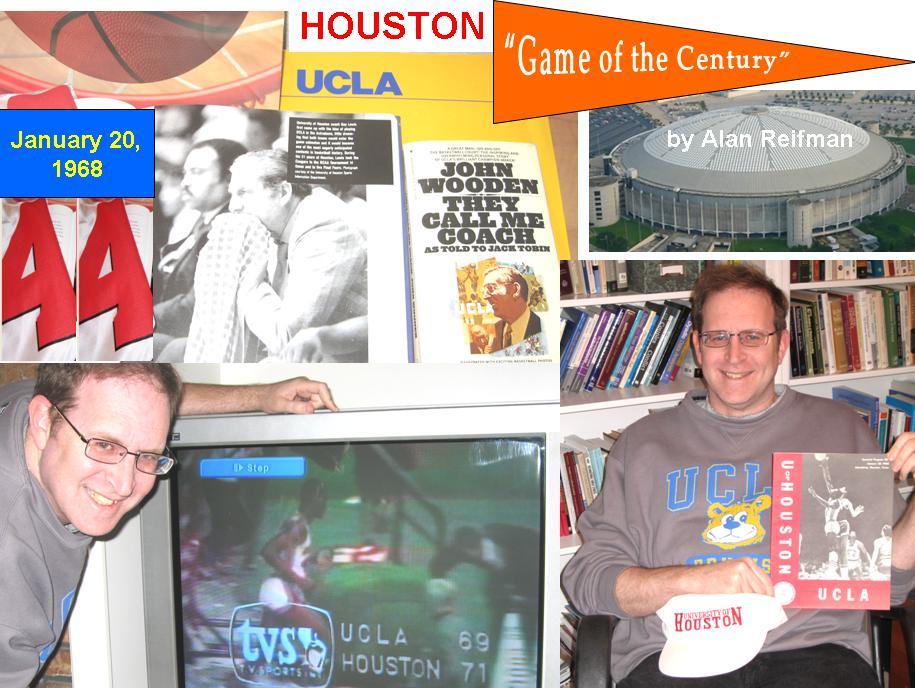With the start of this year's NCAA tournament just a couple of days away, now is a good time for me to review the book How March Became Madness, by Eddie Einhorn with Ron Rapoport. Einhorn, of course, is the person who put together the television package for the 1968 Houston-UCLA Game of the Century. Also, as I wrote about at the time of last fall's World Series, Einhorn has also been part of the Chicago White Sox front office for many years.
The book attempts to provide a history of modern college basketball, with attention to the role of television in developing its popularity. Einhorn and Rapoport do so almost entirely via a series of five-page (roughly) mini-chapters, each based on an interview with a key figure in college hoops history.
The format of self-contained interviews rather than one continuously developing story, makes it easy to pick and choose which interviews you want to read, without worrying about disruption to any continuity. Others may see this as a shortcut on the part of the authors, who evidently elected not to try to integrate all the interviews and present their historical analysis as a traditional text.
These interviews are grouped into sections. One is on the UCLA dynasty, featuring interviews with John Wooden, Kareem Abdul-Jabbar, and Bill Walton.
Not surprisingly, the largest section is on the Game of the Century, with ten chapters. The introduction to this section points out the following:
UCLA's game against Houston in the Astrodome changed the face of college basketball... The stars were all in alignment that night as we had the two top teams in the country -- which were both undefeated -- the top two players, the largest crowd ever to see a basketball game in the United States [52,693, since surpassed], and basketball's first prime-time television audience, which was its largest in history. And to top everything off, it turned out to be a great game, with Houston breaking UCLA's 47-game win streak with a 71-69 victory (p. 33).
The chapters in this section contain interviews with the following individuals (listed with their roles in the GOTC): Houston coach Guy Lewis, Cougar players Elvin Hayes and Don Chaney, UCLA assistant coaches Gary Cunningham and Jerry Norman, Bruin players Lynn Shackelford and Mike Warren, broadcaster Dick Enberg, UH Sports Information Director Ted Nance, and Houston sportswriter Mickey Herskowitz.
Importantly, these chapters convey the many breakthroughs associated with the GOTC: paving the way for college basketball to become a national television mega-hit over the years; raising the profile of basketball in Texas, long famous as a football state; and helping advance the fortunes of the city of Houston and UH, as well as aiding in their racial integration. Noted Chaney:
Three years after Elvin and I got there, Houston had its first black homecoming queen. That was amazing to me, that a school that had been all white could have something like that happen in so short a time (p. 82).
The book also comes with a DVD of the Houston-UCLA Game of the Century, which to me is the best part. It contains the last few minutes of the first half, then the entire second half. The players really seemed to shoot the ball with much more of a high-arch trajectory than is seen today (unless it's some kind of visual illusion). The commercials are edited out, but sometimes the first second or two of a commercial shows; it's interesting to see the kinds of things that were advertised in 1968.
As noted above, however, the book goes beyond the GOTC, encompassing many aspects in the history of modern college basketball. There's a section featuring interviews with great coaches of the modern era: Bob Knight, Mike Krzyzewski, Dean Smith, Roy Williams, etc. The broadcast side of college hoops is covered in sections on great (or at least prominent) broadcasters, including Enberg, Dick Vitale, Billy Packer, and Al Michaels, and on media executives.
I learned an interesting thing from the interview with Bob Knight, who of course coaches at Texas Tech, where I am on the faculty. Shortly after Knight graduated from Ohio State, there was at least a possibility that he would go to law school at UCLA and help coach the freshman team. Imagine, Bob Knight might have progressed to being a UCLA varsity assistant and thus conceivably could have succeeded John Wooden at some point! Could Wooden's good citizenship have tamed the volatility in Knight?
